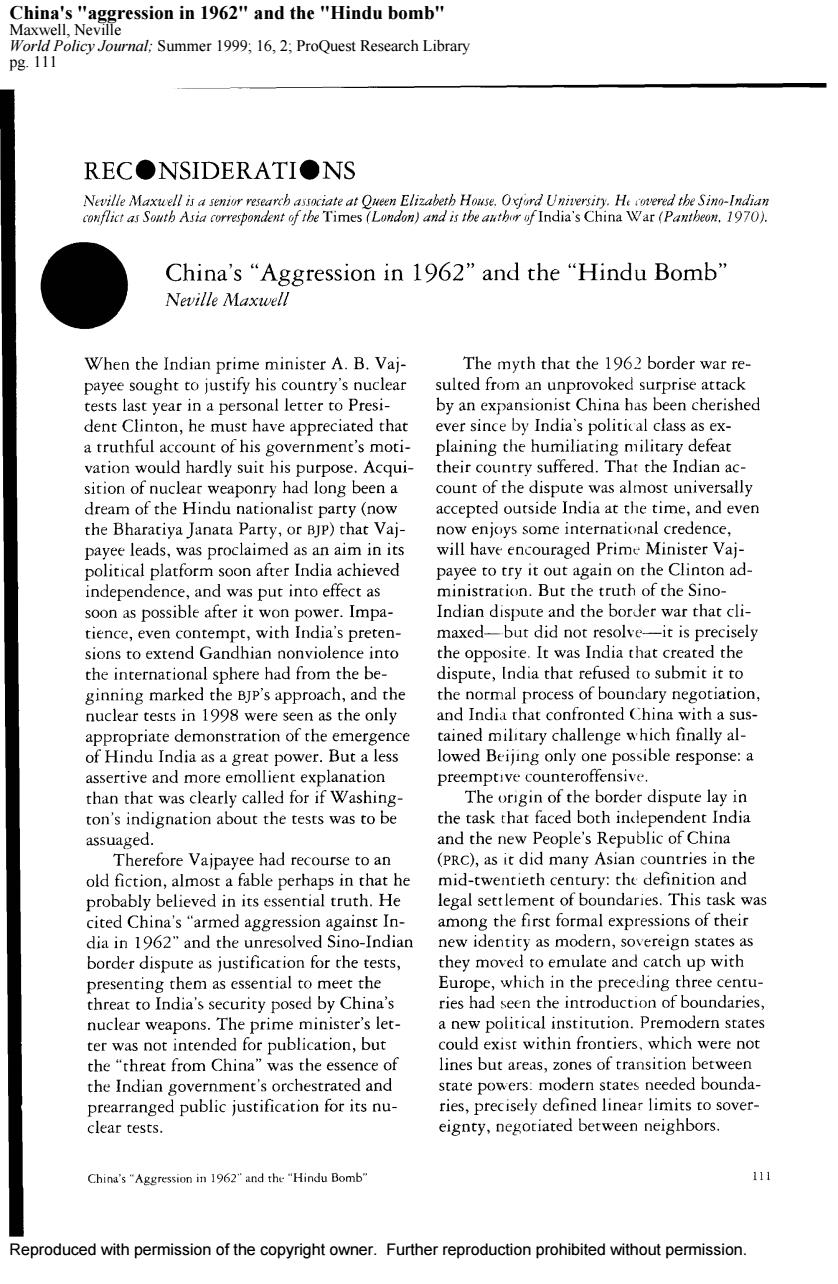
China's "aggression in 1962"and the "Hindu bomb" Maxwell,Neville World Policy Journal;Summer 1999;16,2;ProQuest Research Library Pg.111 REC●NSIDERATI●NS Neville Maxuell is a senior research associate at Queen Elizabeth House.Oxfurd Universiry.He rovered the Sino-Indian conflict as South Asia correspondent of the Times(London)and is the anthr of India's China War (Pantbeon.1970). China's“Aggression in 1962”and the“Hindu Bomb” Neville Maxwell When the Indian prime minister A.B.Vaj- The myth that the 1962 border war re- payee sought to justify his country's nuclear sulted from an unprovoked surprise attack tests last year in a personal letter to Presi- by an expansionist China has been cherished dent Clinton,he must have appreciated that ever since by India's political class as ex- a truthful account of his government's moti- plaining the humiliating military defeat vation would hardly suit his purpose.Acqui- their country suffered.That the Indian ac- sition of nuclear weaponry had long been a count of the dispute was almost universally dream of the Hindu nationalist party(now accepted outside India at the time,and even the Bharatiya Janata Party,or BJP)that Vaj- now enjoys some international credence, payee leads,was proclaimed as an aim in its will have encouraged Prime Minister Vaj- political platform soon after India achieved payee to try it out again on the Clinton ad- independence,and was put into effect as ministration.But the truth of the Sino- soon as possible after it won power.Impa- Indian dispute and the border war that cli- tience,even contempt,with India's preten- maxed-but did not resolve-it is precisely sions to extend Gandhian nonviolence into the opposite.It was India that created the the international sphere had from the be- dispute,India that refused to submit it to ginning marked the BJP's approach,and the the normal process of boundary negotiation, nuclear tests in 1998 were seen as the only and India that confronted China with a sus- appropriate demonstration of the emergence tained military challenge which finally al- of Hindu India as a great power.But a less lowed Beijing only one possible response:a assertive and more emollient explanation preemptive counteroffensive. than that was clearly called for if Washing- The origin of the border dispute lay in ton's indignation about the tests was to be the task that faced both independent India assuaged. and the new People's Republic of China Therefore Vajpayee had recourse to an (PRC),as it did many Asian countries in the old fiction,almost a fable perhaps in that he mid-twentieth century:the definition and probably believed in its essential truth.He legal settlement of boundaries.This task was cited China's"armed aggression against In- among the first formal expressions of their dia in 1962"and the unresolved Sino-Indian new identity as modern,sovereign states as border dispute as justification for the tests, they moved to emulate and catch up with presenting them as essential to meet the Europe,which in the preceding three centu- threat to India's security posed by China's ries had seen the introduction of boundaries, nuclear weapons.The prime minister's let- a new political institution.Premodern states ter was not intended for publication,but could exist within frontiers,which were not the“threat from China'”was the essence of lines but areas,zones of transition between the Indian government's orchestrated and state powers:modern states needed bounda- prearranged public justification for its nu- ries,precisely defined linear limits to sover- clear tests. eignty,negotiated between neighbors. China's "Aggression in 1962"and the "Hindu Bomb" 111 Reproduced with permission of the copyright owner.Further reproduction prohibited without permission
Reproduced with permission of the copyright owner. Further reproduction prohibited without permission. China's "aggression in 1962" and the "Hindu bomb" Maxwell, Neville World Policy Journal; Summer 1999; 16, 2; ProQuest Research Library pg. 111
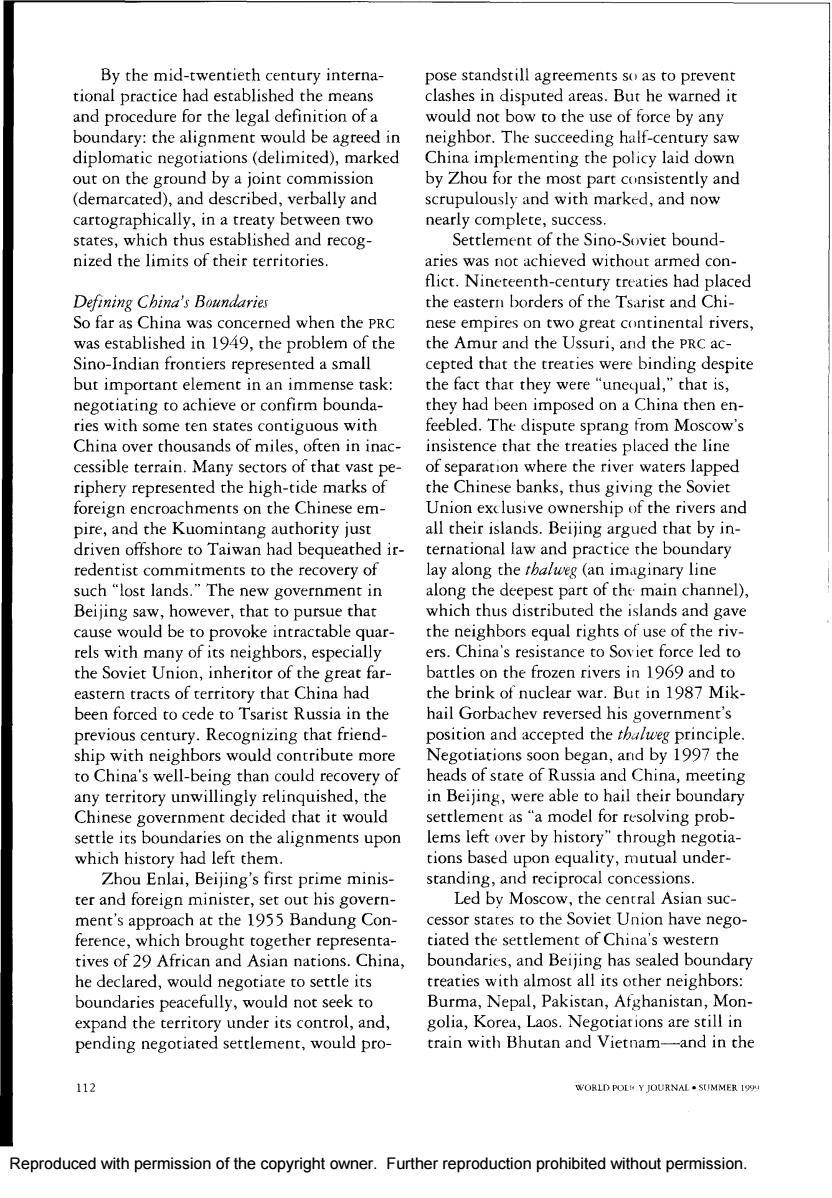
By the mid-twentieth century interna- pose standstill agreements so as to prevent tional practice had established the means clashes in disputed areas.But he warned it and procedure for the legal definition of a would not bow to the use of force by any boundary:the alignment would be agreed in neighbor.The succeeding half-century saw diplomatic negotiations (delimited),marked China implementing the policy laid down out on the ground by a joint commission by Zhou for the most part consistently and (demarcated),and described,verbally and scrupulously and with marked,and now cartographically,in a treaty between two nearly complete,success. states,which thus established and recog- Settlement of the Sino-Soviet bound- nized the limits of their territories. aries was not achieved without armed con- flict.Nineteenth-century treaties had placed Defining China's Boundaries the eastern borders of the Tsarist and Chi- So far as China was concerned when the PRC nese empires on two great continental rivers, was established in 1949,the problem of the the Amur and the Ussuri,and the PRC ac- Sino-Indian frontiers represented a small cepted that the treaties were binding despite but important element in an immense task: the fact that they were "unequal,"that is, negotiating to achieve or confirm bounda- they had been imposed on a China then en- ries with some ten states contiguous with feebled.The dispute sprang from Moscow's China over thousands of miles,often in inac- insistence that the treaties placed the line cessible terrain.Many sectors of that vast pe- of separation where the river waters lapped riphery represented the high-tide marks of the Chinese banks,thus giving the Soviet foreign encroachments on the Chinese em- Union exclusive ownership of the rivers and pire,and the Kuomintang authority just all their islands.Beijing argued that by in- driven offshore to Taiwan had bequeathed ir- ternational law and practice the boundary redentist commitments to the recovery of lay along the thalweg (an imaginary line such "lost lands."The new government in along the deepest part of the main channel), Beijing saw,however,that to pursue that which thus distributed the islands and gave cause would be to provoke intractable quar- the neighbors equal rights of use of the riv- rels with many of its neighbors,especially ers.China's resistance to Soviet force led to the Soviet Union,inheritor of the great far- battles on the frozen rivers in 1969 and to eastern tracts of territory that China had the brink of nuclear war.But in 1987 Mik- been forced to cede to Tsarist Russia in the hail Gorbachev reversed his government's previous century.Recognizing that friend- position and accepted the thalweg principle ship with neighbors would contribute more Negotiations soon began,and by 1997 the to China's well-being than could recovery of heads of state of Russia and China,meeting any territory unwillingly relinquished,the in Beijing,were able to hail their boundary Chinese government decided that it would settlement as"a model for resolving prob- settle its boundaries on the alignments upon lems left over by history"through negotia- which history had left them. tions based upon equality,mutual under- Zhou Enlai,Beijing's first prime minis- standing,and reciprocal concessions. ter and foreign minister,set out his govern- Led by Moscow,the central Asian suc- ment's approach at the 1955 Bandung Con- cessor states to the Soviet Union have nego- ference,which brought together representa- tiated the settlement of China's western tives of 29 African and Asian nations.China, boundaries,and Beijing has sealed boundary he declared,would negotiate to settle its treaties with almost all its other neighbors: boundaries peacefully,would not seek to Burma,Nepal,Pakistan,Afghanistan,Mon- expand the territory under its control,and, golia,Korea,Laos.Negotiations are still in pending negotiated settlement,would pro- train with Bhutan and Vietnam-and in the 112 WORLD POLI Y JOURNAL SUMMER 1999 Reproduced with permission of the copyright owner.Further reproduction prohibited without permission
Reproduced with permission of the copyright owner. Further reproduction prohibited without permission
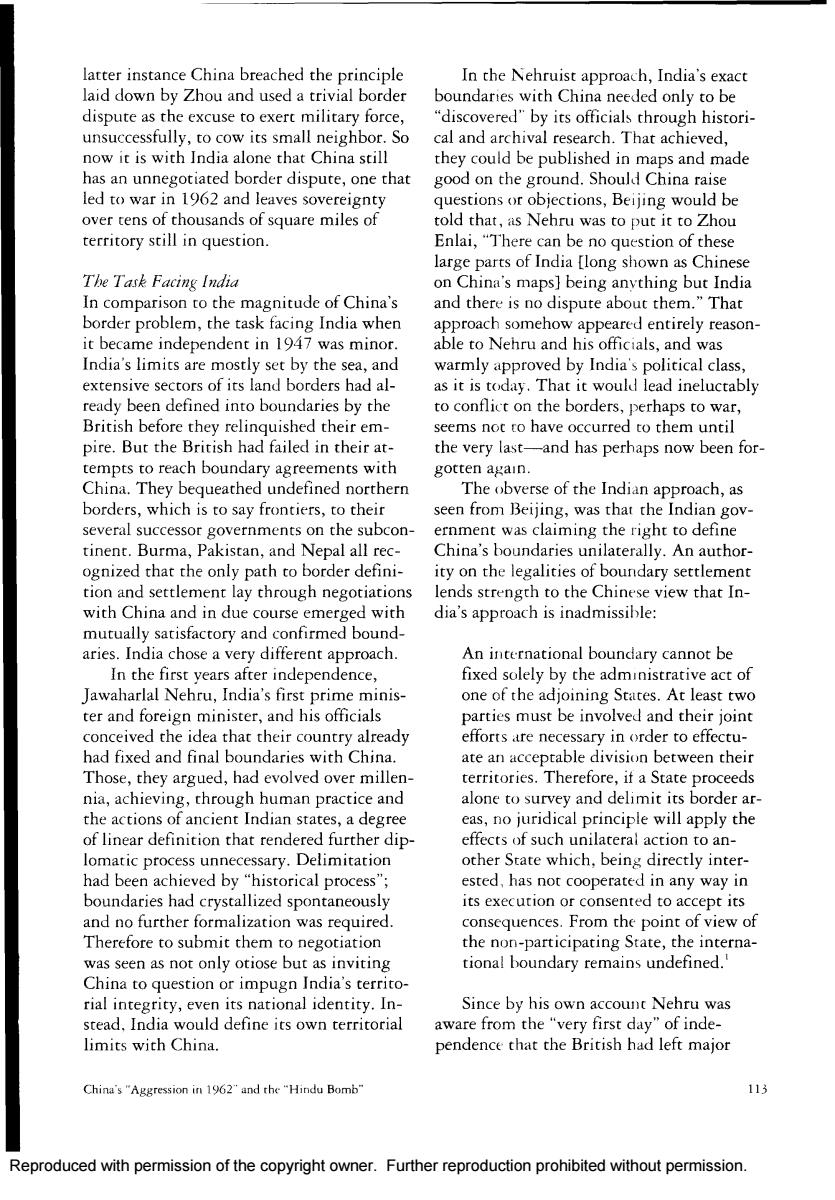
latter instance China breached the principle In the Nehruist approach,India's exact laid down by Zhou and used a trivial border boundaries with China needed only to be dispute as the excuse to exert military force, "discovered"by its officials through histori- unsuccessfully,to cow its small neighbor.So cal and archival research.That achieved, now it is with India alone that China still they could be published in maps and made has an unnegotiated border dispute,one that good on the ground.Should China raise led to war in 1962 and leaves sovereignty questions or objections,Beijing would be over tens of thousands of square miles of told that,as Nehru was to put it to Zhou territory still in question. Enlai,"There can be no question of these large parts of India [long shown as Chinese The Task Facing India on China's maps]being anything but India In comparison to the magnitude of China's and there is no dispute about them."That border problem,the task facing India when approach somehow appeared entirely reason- it became independent in 1947 was minor. able to Nehru and his officials,and was India's limits are mostly set by the sea,and warmly approved by India's political class, extensive sectors of its land borders had al- as it is today.That it would lead ineluctably ready been defined into boundaries by the to conflict on the borders,perhaps to war, British before they relinquished their em- seems not to have occurred to them until pire.But the British had failed in their at- the very last-and has perhaps now been for- tempts to reach boundary agreements with gotten again. China.They bequeathed undefined northern The obverse of the Indian approach,as borders,which is to say frontiers,to their seen from Beijing,was that the Indian gov- several successor governments on the subcon- ernment was claiming the right to define tinent.Burma,Pakistan,and Nepal all rec- China's boundaries unilaterally.An author- ognized that the only path to border defini- ity on the legalities of boundary settlement tion and settlement lay through negotiations lends strength to the Chinese view that In- with China and in due course emerged with dia's approach is inadmissible: mutually satisfactory and confirmed bound- aries.India chose a very different approach. An international boundary cannot be In the first years after independence, fixed solely by the administrative act of Jawaharlal Nehru,India's first prime minis- one of the adjoining States.At least two ter and foreign minister,and his officials parties must be involved and their joint conceived the idea that their country already efforts are necessary in order to effectu- had fixed and final boundaries with China. ate an acceptable division between their Those,they argued,had evolved over millen- territories.Therefore,if a State proceeds nia,achieving,through human practice and alone to survey and delimit its border ar- the actions of ancient Indian states,a degree eas,no juridical principle will apply the of linear definition that rendered further dip- effects of such unilateral action to an- lomatic process unnecessary.Delimitation other State which,being directly inter- had been achieved by "historical process"; ested,has not cooperated in any way in boundaries had crystallized spontaneously its execution or consented to accept its and no further formalization was required consequences.From the point of view of Therefore to submit them to negotiation the non-participating State,the interna- was seen as not only otiose but as inviting tional boundary remains undefined. China to question or impugn India's territo- rial integrity,even its national identity.In- Since by his own account Nehru was stead,India would define its own territorial aware from the "very first day"of inde- limits with China. pendence that the British had left major China's"Aggression in 1962"and the"Hindu Bomb" 113 Reproduced with permission of the copyright owner.Further reproduction prohibited without permission
Reproduced with permission of the copyright owner. Further reproduction prohibited without permission
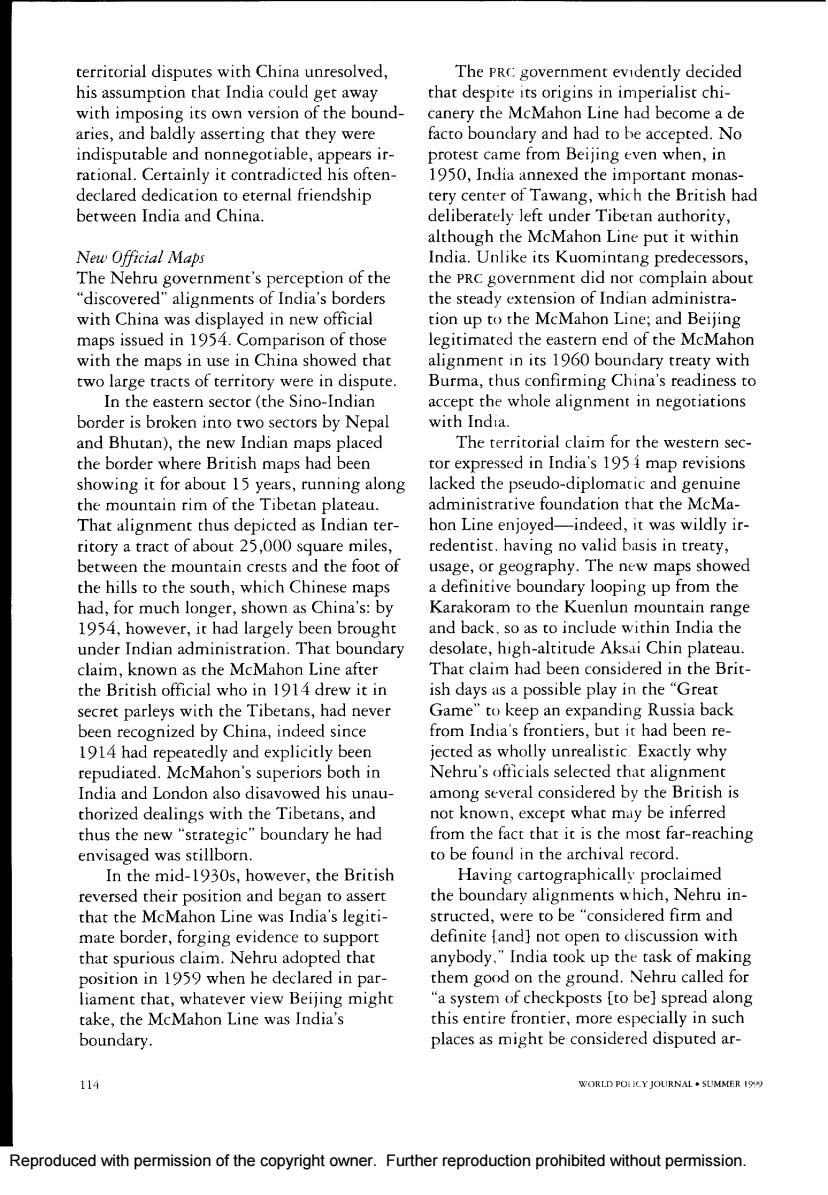
territorial disputes with China unresolved, The PRC government evidently decided his assumption chat India could get away that despite its origins in imperialist chi- with imposing its own version of the bound- canery the McMahon Line had become a de aries,and baldly asserting that they were facto boundary and had to be accepted.No indisputable and nonnegotiable,appears ir- protest came from Beijing even when,in rational.Certainly it contradicted his often- 1950,India annexed the important monas- declared dedication to eternal friendship tery center of Tawang,which the British had between India and China. deliberately left under Tibetan authority, although the McMahon Line put it within New Official Maps India.Unlike its Kuomintang predecessors, The Nehru government's perception of the the PRC government did not complain about "discovered"alignments of India's borders the steady extension of Indian administra- with China was displayed in new official tion up to the McMahon Line;and Beijing maps issued in 1954.Comparison of those legitimated the eastern end of the McMahon with the maps in use in China showed that alignment in its 1960 boundary treaty with two large tracts of territory were in dispute. Burma,thus confirming China's readiness to In the eastern sector(the Sino-Indian accept the whole alignment in negotiations border is broken into two sectors by Nepal with India. and Bhutan),the new Indian maps placed The territorial claim for the western sec- the border where British maps had been tor expressed in India's 195 i map revisions showing it for about 15 years,running along lacked the pseudo-diplomatic and genuine the mountain rim of the Tibetan plateau. administrative foundation that the McMa- That alignment thus depicted as Indian ter- hon Line enjoyed-indeed,it was wildly ir- ritory a tract of about 25,000 square miles, redentist.having no valid basis in treaty, between the mountain crests and the foot of usage,or geography.The new maps showed the hills to the south,which Chinese maps a definitive boundary looping up from the had,for much longer,shown as China's:by Karakoram to the Kuenlun mountain range 1954,however,it had largely been brought and back,so as to include within India the under Indian administration.That boundary desolate,high-altitude Aksai Chin plateau. claim,known as the McMahon Line after That claim had been considered in the Brit- the British official who in 1914 drew it in ish days as a possible play in the "Great secret parleys with the Tibetans,had never Game"to keep an expanding Russia back been recognized by China,indeed since from India's frontiers,but it had been re- 1914 had repeatedly and explicitly been jected as wholly unrealistic.Exactly why repudiated.McMahon's superiors both in Nehru's officials selected that alignment India and London also disavowed his unau- among several considered by the British is thorized dealings with the Tibetans,and not known,except what may be inferred thus the new "strategic"boundary he had from the fact that it is the most far-reaching envisaged was stillborn. to be found in the archival record. In the mid-1930s,however,the British Having cartographically proclaimed reversed their position and began to assert the boundary alignments which,Nehru in- that the McMahon Line was India's legiti- structed,were to be "considered firm and mate border,forging evidence to support definite [and]not open to discussion with that spurious claim.Nehru adopted that anybody,"India took up the task of making position in 1959 when he declared in par- them good on the ground.Nehru called for liament chat,whatever view Beijing might "a system of checkposts [to be]spread along take,the McMahon Line was India's this entire frontier,more especially in such boundary places as might be considered disputed ar- 114 WORLD POLICY JOURNAL.SUMMER 1999 Reproduced with permission of the copyright owner.Further reproduction prohibited without permission
Reproduced with permission of the copyright owner. Further reproduction prohibited without permission
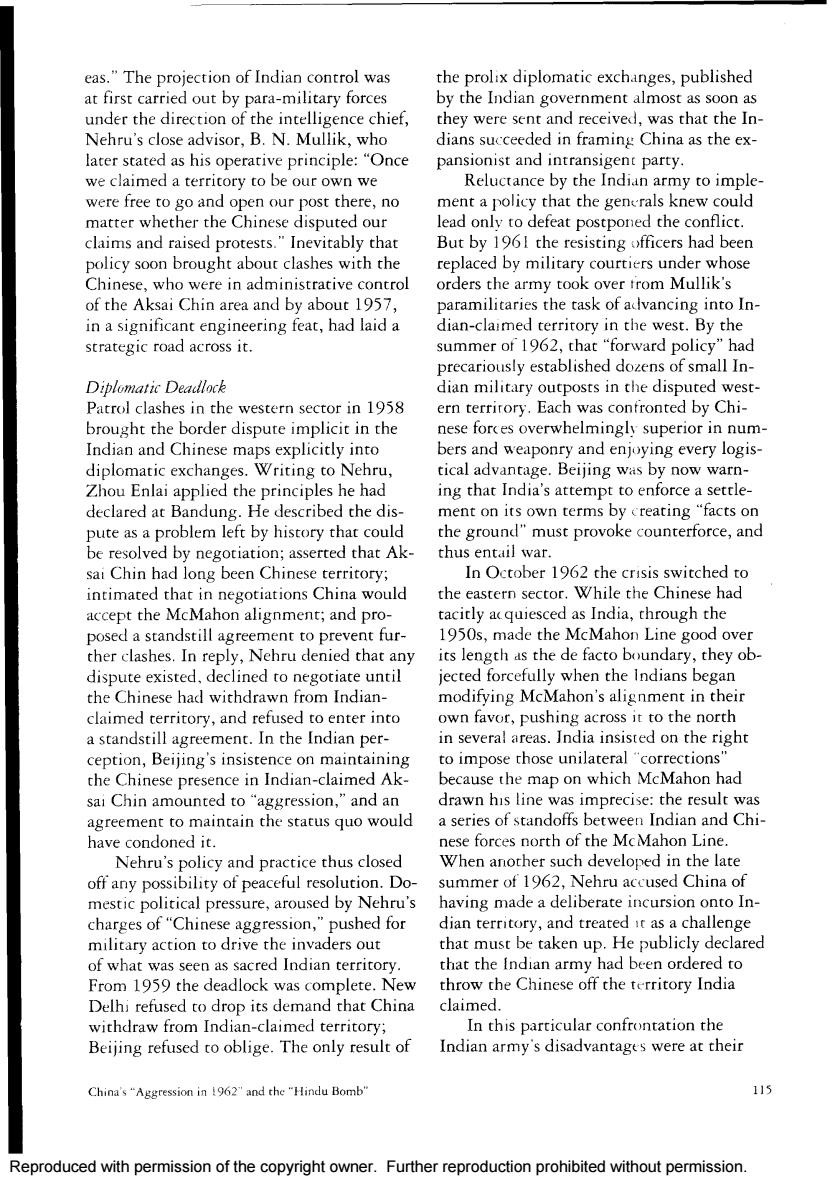
eas."The projection of Indian control was the prolix diplomatic exchanges,published at first carried out by para-military forces by the Indian government almost as soon as under the direction of the intelligence chief, they were sent and received,was that the In- Nehru's close advisor,B.N.Mullik,who dians succeeded in framing China as the ex- later stated as his operative principle:"Once pansionist and intransigent party. we claimed a territory to be our own we Reluctance by the Indian army to imple- were free to go and open our post there,no ment a policy that the generals knew could matter whether the Chinese disputed our lead only to defeat postponed the conflict. claims and raised protests."Inevitably that But by 1961 the resisting officers had been policy soon brought about clashes with the replaced by military courtiers under whose Chinese,who were in administrative control orders the army took over trom Mullik's of the Aksai Chin area and by about 1957, paramilitaries the task of advancing into In- in a significant engineering feat,had laid a dian-claimed territory in the west.By the strategic road across it. summer of 1962,that "forward policy"had precariously established dozens of small In- Diplomatic Deadlock dian military outposts in the disputed west- Patrol clashes in the western sector in 1958 ern terrirory.Each was confronted by Chi- brought the border dispute implicit in the nese forces overwhelmingly superior in num- Indian and Chinese maps explicitly into bers and weaponry and enjoying every logis- diplomatic exchanges.Writing to Nehru, tical advantage.Beijing was by now warn- Zhou Enlai applied the principles he had ing that India's attempt to enforce a settle- declared at Bandung.He described the dis- ment on its own terms by creating "facts on pute as a problem left by history that could the ground"must provoke counterforce,and be resolved by negotiation;asserted that Ak- thus entail war. sai Chin had long been Chinese territory; In October 1962 the crisis switched to intimated that in negotiations China would the eastern sector.While the Chinese had accept the McMahon alignment;and pro- tacitly acquiesced as India,through the posed a standstill agreement to prevent fur- 1950s,made the McMahon Line good over ther clashes.In reply,Nehru denied that any its length as the de facto boundary,they ob- dispute existed,declined to negotiate until jected forcefully when the Indians began the Chinese had withdrawn from Indian- modifying McMahon's alignment in their claimed territory,and refused to enter into own favor,pushing across it to the north a standstill agreement.In the Indian per- in several areas.India insisted on the right ception,Beijing's insistence on maintaining to impose those unilateral "corrections' the Chinese presence in Indian-claimed Ak- because the map on which McMahon had sai Chin amounted to“aggression,”and an drawn his line was imprecise:the result was agreement to maintain the status quo would a series of standoffs between Indian and Chi- have condoned it. nese forces north of the McMahon Line. Nehru's policy and practice thus closed When another such developed in the late off any possibility of peaceful resolution.Do- summer of 1962,Nehru accused China of mestic political pressure,aroused by Nehru's having made a deliberate incursion onto In- charges of"Chinese aggression,"pushed for dian territory,and treated it as a challenge military action to drive the invaders out that must be taken up.He publicly declared of what was seen as sacred Indian territory. that the Indian army had been ordered to From 1959 the deadlock was complete.New throw the Chinese off the territory India Delhi refused to drop its demand that China claimed. withdraw from Indian-claimed territory; In this particular confrontation the Beijing refused to oblige.The only result of Indian army's disadvantages were at their China's "Aggression in 1962"and the "Hindu Bomb" 115 Reproduced with permission of the copyright owner.Further reproduction prohibited without permission
Reproduced with permission of the copyright owner. Further reproduction prohibited without permission
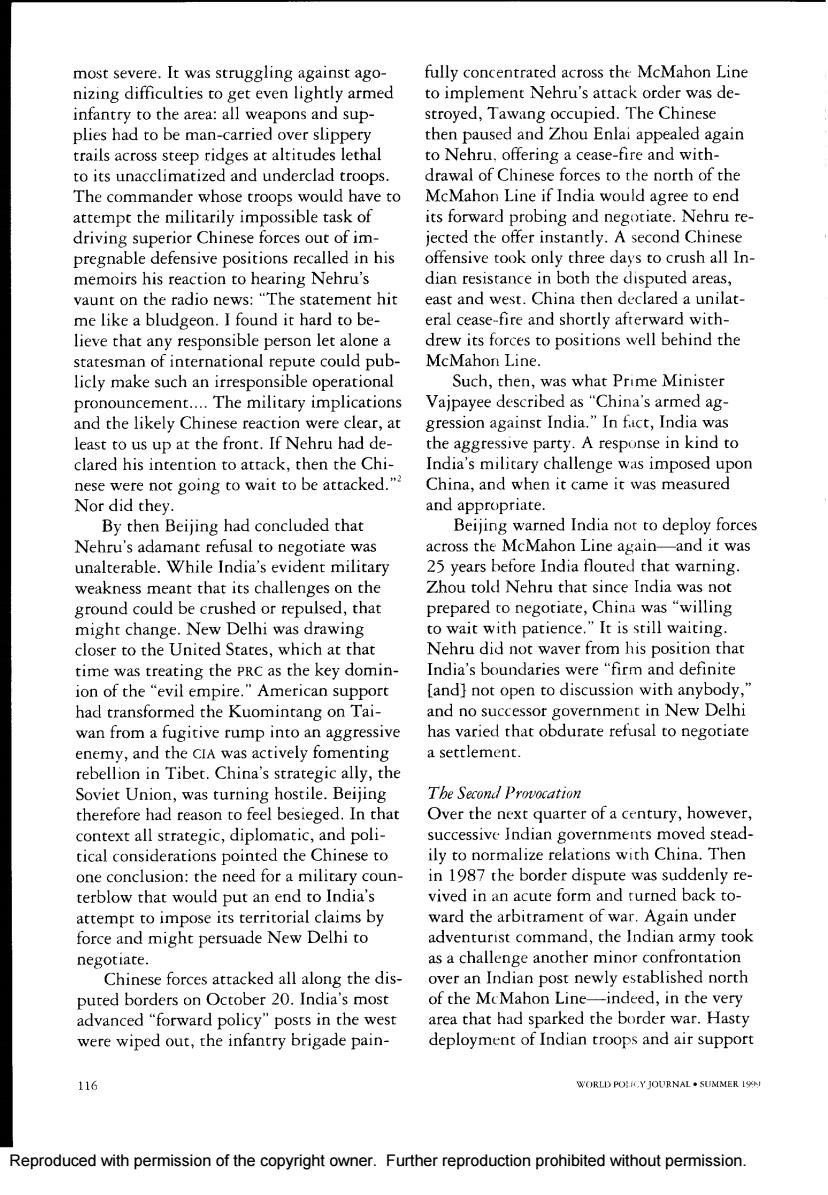
most severe.It was struggling against ago- fully concentrated across the McMahon Line nizing difficulties to get even lightly armed to implement Nehru's attack order was de- infantry to the area:all weapons and sup- stroyed,Tawang occupied.The Chinese plies had to be man-carried over slippery then paused and Zhou Enlai appealed again trails across steep ridges at altitudes lethal to Nehru,offering a cease-fire and with- to its unacclimatized and underclad troops. drawal of Chinese forces to the north of the The commander whose troops would have to McMahon Line if India would agree to end attempt the militarily impossible task of its forward probing and negotiate.Nehru re- driving superior Chinese forces out of im- jected the offer instantly.A second Chinese pregnable defensive positions recalled in his offensive took only three days to crush all In- memoirs his reaction to hearing Nehru's dian resistance in both the disputed areas, vaunt on the radio news:"The statement hit east and west.China then declared a unilat- me like a bludgeon.I found it hard to be- eral cease-fire and shortly afterward with- lieve that any responsible person let alone a drew its forces to positions well behind the statesman of international repute could pub-McMahon Line. licly make such an irresponsible operational Such,then,was what Prime Minister pronouncement....The military implications Vajpayee described as "China's armed ag- and the likely Chinese reaction were clear,at gression against India."In fact,India was least to us up at the front.If Nehru had de- the aggressive party.A response in kind to clared his intention to attack,then the Chi- India's military challenge was imposed upon nese were not going to wait to be atcacked."2 China,and when it came it was measured Nor did they. and appropriate. By then Beijing had concluded that Beijing warned India not to deploy forces Nehru's adamant refusal to negotiate was across the McMahon Line again-and it was unalterable.While India's evident military 25 years before India flouted that warning. weakness meant that its challenges on the Zhou told Nehru that since India was not ground could be crushed or repulsed,that prepared to negotiate,China was "willing might change.New Delhi was drawing to wait with patience."It is still waiting. closer to the United States,which at that Nehru did not waver from his position that time was treating the PRC as the key domin- India's boundaries were "firm and definite ion of the "evil empire."American support [and]not open to discussion with anybody, had transformed the Kuomintang on Tai- and no successor government in New Delhi wan from a fugitive rump into an aggressive has varied that obdurate refusal to negotiate enemy,and the CIA was actively fomenting a settlement. rebellion in Tibet.China's strategic ally,the Soviet Union,was turning hostile.Beijing The Second Provocation therefore had reason to feel besieged.In that Over the next quarter of a century,however, context all strategic,diplomatic,and poli- successive Indian governments moved stead- tical considerations pointed the Chinese to ily to normalize relations with China.Then one conclusion:the need for a military coun- in 1987 the border dispute was suddenly re- terblow that would put an end to India's vived in an acute form and turned back to- attempt to impose its territorial claims by ward the arbitrament of war.Again under force and might persuade New Delhi to adventurist command,the Indian army took negotiate. as a challenge another minor confrontation Chinese forces attacked all along the dis- over an Indian post newly established north puted borders on October 20.India's most of the McMahon Line-indeed,in the very advanced "forward policy"posts in the west area that had sparked the border war.Hasty were wiped out,the infantry brigade pain- deployment of Indian troops and air support 116 WORLD POLICY JOURNAL+SUMMER 19N Reproduced with permission of the copyright owner.Further reproduction prohibited without permission
Reproduced with permission of the copyright owner. Further reproduction prohibited without permission

squadrons built up massive forces in the "line of actual control"did not prejudice eastern sector and the Indians then made nu- either side's position in the territorial dis- merous additional shallow advances across pute,was exactly what Zhou Enlai had the McMahon Line.The commander behind sought in 1950 as the indispensable pre- this provocation had recently visited Viet- liminary to negotiation. nam and apparently acquired the belief that In 1996 a further agreement was signed, if the Chinese hit back,the Indian forces, on "confidence-building measures in the by now strongly equipped and well trained, military field"along the "line of actual con- could encircle and annihilate their enemies trol."India and China were beginning to -and thus erase the stain left by the rout of build up a relationship of mutual trust.Im- the army in 1962. plicit in that diplomatic and political pro- China declined to be provoked,although cess was an Indian admission,never to be it heavily reinforced along the threatened expressed of course and perhaps even sub- border.Washington,its position now re- conscious,that India was not a victim of versed from what it had been in 1962,ex- "China's armed aggression in 1962"but erted its decisive influence to induce the that the border war had contrary causes.It Indian government to call its army off.In- is that which makes the Indian government's dia extended an olive branch by seeking an revival of the old canard such a significant invitation for the prime minister,Rajiv Gan- and ominous reversal. dhi,to visit Beijing,and the slow search for rapprochement was resumed.The Indian A Bogus E.xcuse military challenge had left the opposing The Indian government's use of the "threat forces in dangerously close confrontation, from China"as an excuse for India's nuclear however,and political compulsions in India tests was doubly bogus.Not only was the meant that the Indians could not make sig- evidence advanced for the existence of the nificant unilateral disengagements.It was threat-"China's armed aggression in 1962" six years before New Delhi found a way to -spurious,but in fact China had very little remedy that situation,which had left the In- to do with the Indian government's decision dian army deployed in strength in offensive to test again.The PRC "went nuclear"in positions in immensely difficult terrain,a 1964 in the context of open threats of nu- posture of great strain and expense. clear attack against it from the United States At last an Indian government found the and the emerging hostility of the Soviet courage to begin to extricate the country Union:the dispute with India,always seen from the position in which Nehru had im- by Beijing as a passing irrelevance,had noth- paled it.Prime Minister Narasimha Rao and ing to do with that decision.The govern- his foreign secretary,J.N.Dixit,moved to ment responsible for India's one-off "peace- demolish one of the two great obstacles Neh-ful"nuclear explosion in 1974 made only ru had left in the way of pacification of the vague allusion to China's nuclear capacity, borders and their ultimate settlement:the and until the BJP came to power in 1998 refusal to join in a standstill agreement.Act- India,as has been seen,was moving toward ing with the utmost caution so that the poli- rapprochement with Beijing. ticians'chauvinism was not aroused,they The Indian tests,contrary to the BJP's negotiated with the Chinese an agreement justifications,had little or nothing to do "on the maintenance of peace and tranquil- with concern about the country's interna- ity along the line of actual control in the tional security environment-which was in India-China border areas,"signed as a treaty fact,before the tests,safer than it had ever in September 1993.That,with its crucial been.India's military superiority over Paki- disclaimer that the treaty's references to the stan was unchallengeable;there had never China's "Aggression in 1962"and the"Hindu Bomb" 117 Reproduced with permission of the copyright owner.Further reproduction prohibited without permission
Reproduced with permission of the copyright owner. Further reproduction prohibited without permission

been,and was not,any conceivable Chinese itial reaction of the Indian political class to interest in hostilities with India.The tests the nuclear tests demonstrated the extent to were,rather,a crucial element in the Hindu which the BJP's ideology has been accepted, nationalists'attempt to bring about a change and suggests that even if the Hindu nation- in the political climate in India.They were alists'precarious hold on parliamentary calculated to unify the nation behind a virile power is lost,no successor government will display of martial potency and to put the be able to break free from the delusion that world on notice that Bharat Mahta,Mother the Sino-Indian boundaries,as defined by India,had to be accepted as a great power, India,are final,fixed,and legitimate,and deserving,among other recognitions,a seat therefore that China's occupation of Indian on the U.N.Security Council. irredenta amounts to aggression. That political climate change is already well advanced,as the liberal,democratic, Notes and secular structure that India inherited at This article is drawn from a fully documented independence has eroded with time and monograph,China's "Aggression"of 1962 (published been fractured by the blows and tactics of in 1999 by Court Place Books,33 Oxford Road,Old the religious nationalism that has always Marston,Oxford OX3 OPQ,$7.00,including been the deeper and truer expression of In- postage). dian identity.The sense of sacred territory,a 1.A.O.Cukwarah,The Settlement of Boundary kind of Hindu zionism,is inherent in that, Disputes in International Law (Manchester University and can be traced in the political rhetoric Press,19671,p.159. even of Nehru's time,secularism's high 2.Major General Niranjan Prasad,The Fall of noon.The overwhelmingly supportive in- Tawang (New Delhi:Palit Palit,1981),p.69. 118 WORLD POLH Y JOURNAL SUMMER 1999 Reproduced with permission of the copyright owner.Further reproduction prohibited without permission
Reproduced with permission of the copyright owner. Further reproduction prohibited without permission